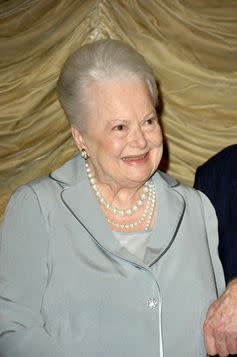Olivia and Kirk: last of the Hollywood golden greats

Hollywood’s “golden era” is often seen as beginning with the rise of the studio system in the 1920s. This in turn spawned popular stars such as Clark Gable, Kathrine Hepburn, Ingrid Bergman, Marlene Dietrich, Spencer Tracey and Humphrey Bogart, as well as classic movies that ranged from epics such as Gone with the Wind, to all-singing, all-dancing musicals like Singin’ in the Rain.
In the summer of 2016, Olivia de Havilland celebrated her 100th birthday, a milestone soon matched by Kirk Douglas who reached his centenary in December. Although they never starred together, they were both products of the Hollywood studio system. Their 100th birthdays brought them back into the public consciousness, evoking memories of two lives lived in the glare of the media spotlight.
They are the last major figures of a film tradition which touched the lives of millions but which has now been superseded by very different forms of stardom and celebrity. Each rebelled against the limitations of their roles and in doing so helped to break the system which had both made and confined them.

Both de Havilland and Douglas shared migrant backgrounds. She was born in Japan to English parents and he is a first generation American whose parents came from present day Belarus. Douglas lived the American Dream, rising from hardship to win a scholarship at the American Academy of Dramatic Arts in New York. De Havilland’s upbringing was more comfortable but she demonstrated her independence by defying her father’s wishes to pursue a career as an actress.
After making his Hollywood debut in 1946, Douglas established his name as a tough guy in crime films and melodramas such as Out of the Past (1947) and Ace in the Hole (1951), combining charm with an underlying menace. He moved to heroic roles culminating in Stanley Kubrick’s Spartacus (1960).
De Havilland’s rise was meteoric as she appeared in a series of romantic historical movies typified by The Adventures of Robin Hood (1938) opposite Errol Flynn. Her much remarked upon beauty was matched by spirited characterisations, reaching a height of popularity with Gone with the Wind (1939).
Manufacturing stardom
Film historian Richard de Cordova has shown how stardom was a key feature in the development of Hollywood’s studio system almost from its beginnings. As audiences requested new films from the unnamed performers on screen, the studios began to manufacture work which showcased a given actor’s persona. A whole swathe of other personnel were then drafted in to create and maintain a star’s appeal. This ranged across publicity stills, carefully managed public appearances and regulation of what the media reported; scandals could be covered up, though not entirely – Kenneth Anger’s 1959 book Hollywood Babylon detailed the most sensational cases.
The studios developed a cosy, mutually beneficial relationship with the mainstream press, whereby limited access to the stars was given in exchange for positive coverage. This reciprocal arrangement promoted movies and sold newspapers, but it also required the press to look the other way when stars transgressed, as in the case of Errol Flynn who attracted the attention of the authorities on more than one occasion.
But if the star system brought success it could also stifle actors. Both Douglas and de Havilland were unhappy with the roles offered to them and begrudged their lack of self-determination. The latter was maintained by the studios through lengthy, restrictive contracts that could last seven years and which allowed actors to be pressured into remaining within the career boundaries which had been set for them.
Douglas began to take control by forming his own production company, Bryna, in 1955. This not only enabled him to take more varied leading roles in films like Lonely are the Brave (1962), his personal favourite, but also to make work which reflected his liberal politics such as Seven Days in May (1964) and the anti-war Paths of Glory (1957). His willingness to extend his range was given full justification by one of his most celebrated performances, as the artist Vincent van Gogh in Vincente Minnelli’s Lust for Life (1956).

With even less autonomy, de Havilland showed remarkable courage in refusing the roles offered to her by Warner Brothers. In 1940, this resulted in the first of several suspensions. When her seven-year contract ended in 1943, Warner imposed a further six months to cover these suspensions and de Havilland took them to court. Her victory on appeal in 1944 was a landmark case in the history of American film stardom and the first crack in the studios’ hold over their most important commercial assets.
The lives of Douglas and de Havilland have taken them into an era where performers have benefited greatly from the independence which these stars helped make possible. Today’s stars employ a retinue of lawyers, agents and managers to handle their careers. Many have their own production companies and initiate projects, enjoying a level of autonomy, and wealth, previously undreamed of.
However, there has been a price to pay. Free to enjoy a wider range of roles, contemporary stars can appear more real to audiences and therefore prone to more everyday failings than their predecessors. The press can no longer be bribed with access and feel empowered to expose every embarrassing lapse to the vast global audience which can find their private lives at the click of a mouse button.
While the Hollywood star system ruled over the lives of performers like Douglas and de Havilland – who have lived to see decades of change in the film industry – it also preserved them in a halo of untouchable glamour. We may not see their like again.
This article was originally published on The Conversation. Read the original article.

Robert Shail has received funding from the Leverhulme Trust and the Arts and Humanities Research Council.

 Yahoo News
Yahoo News 